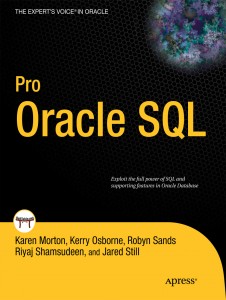Funny Developer Tricks – Decode
I ran into a really ugly SQL statement last week. It was the most expensive statement running on the system for the last several weeks. On top of the fact that the statement ran for hours, it also had a number of “issues”. The statement had the following characteristics:
- Several DISTINCT Operators – these tend to show up in statements where developers have left off a join condition
- ANSI Join Syntax – generally Oracle converts this syntax back to Oracle join syntax under the covers. I realize this is standard SQL syntax, but it still makes me nervous due to previous experience with problems caused by this conversion process.
- Functions Used in WHERE Clauses (DECODE and NVL in particular) – can disable indexes
- UNION – forces a sort of the union’ed result sets so that it can eliminate duplicates (which is often not necessary). Depending on how the statement is coded, UNIONs can also sometimes result in multiple accesses of the same objects (i.e. if the developer has used the UNION in the place of a more robust where clause).
- Numerous != and <> Comparison Operators – Not necessarily a problem but often can be coded in a more efficient manner
- Several OR’s – OR’s are tricky. I get suspicious when there are numerous other problems in a statement as well.
I’ll refrain from publishing the actual statement to protect the guilty, but one of the most interesting bits of the statement looked something like this:
...
WHERE a.col1 = DECODE ('XYZ', '*', a.col1 ,'XYZ')
...
The processing of the where clause can be roughly translated to the following psuedo code:
if 'XYZ' = '*' then
x = a.col1
else
x = 'XYZ'
end if
...
WHERE a.col1 = x
...
Since the literal ‘XYZ’ will never be equal to the literal ‘*’, the value returned by this DECODE will always be ‘XYZ’. Therefore the statement could have been written much more simply as:
...
WHERE a.col1 = 'XYZ'
...
So this is an extremely strange way to write the statement and clouds the intention considerably, but does it hurt performance? Well actually no. The optimizer is smart enough to know that this DECODE will always result in the same literal value and so it appears that Oracle does not run the DECODE statement for each row. Here’s a quick example from a 10.2.0.4 database. (note that I used dplan.sql and fss.sql in this code snippet)
SYS@LAB1024> -- first a DECODE that actually does something
SYS@LAB1024> select count(pk_col) from kso.skew where col2 = DECODE(col1,1,col2,'asd');
COUNT(PK_COL)
-------------
3199971
Elapsed: 00:00:06.62
SYS@LAB1024> @fss
Enter value for sql_text: select count(pk_col) from kso.skew where col2 = DECODE(col1,1,col2,'asd')
Enter value for sql_id:
SQL_ID CHILD EXECS AVG_ROWS AVG_ETIME AVG_CPU AVG_PIO AVG_LIO SQL_TEXT
------------- ------ ---------- ---------- ------------- ------------- ------------- ------------ ----------------------------------------
45ynyjvg6hyyh 0 1 1 6.46 6.41 111,029.00 162,298 select count(pk_col) from kso.skew where
Elapsed: 00:00:00.07
SYS@LAB1024> @dplan
Enter value for sql_id: 45ynyjvg6hyyh
Enter value for child_no:
PLAN_TABLE_OUTPUT
--------------------------------------------------------------------------------------------------------------------------------------------------------------------------------------------------------
SQL_ID 45ynyjvg6hyyh, child number 0
-------------------------------------
select count(pk_col) from kso.skew where col2 =
DECODE(col1,1,col2,'asd')
Plan hash value: 568322376
---------------------------------------------------------------------------
| Id | Operation | Name | Rows | Bytes | Cost (%CPU)| Time |
---------------------------------------------------------------------------
| 0 | SELECT STATEMENT | | | | 4 (100)| |
| 1 | SORT AGGREGATE | | 1 | 16 | | |
|* 2 | TABLE ACCESS FULL| SKEW | 1234 | 19744 | 4 (0)| 00:00:01 |
---------------------------------------------------------------------------
Predicate Information (identified by operation id):
---------------------------------------------------
2 - filter("COL2"=DECODE("COL1",1,"COL2",'asd'))
20 rows selected.
Elapsed: 00:00:00.06
SYS@LAB1024> -- Now one that is equivalent to WHERE col2 = 'asddsadasd'
SYS@LAB1024> select count(pk_col) from kso.skew where col2 = DECODE('asddsadasd','*', col2, 'asddsadasd');
COUNT(PK_COL)
-------------
32000000
Elapsed: 00:00:03.88
SYS@LAB1024> @fss
Enter value for sql_text: select count(pk_col) from kso.skew where col2 = DECODE('asddsadasd','*', col2, 'asddsadasd')
Enter value for sql_id:
SQL_ID CHILD EXECS AVG_ROWS AVG_ETIME AVG_CPU AVG_PIO AVG_LIO SQL_TEXT
------------- ------ ---------- ---------- ------------- ------------- ------------- ------------ ----------------------------------------
4u3nbf55z1ztd 0 1 1 3.88 3.88 111,054.50 162,298 select count(pk_col) from kso.skew where
Elapsed: 00:00:00.07
SYS@LAB1024> @dplan
Enter value for sql_id: 4u3nbf55z1ztd
Enter value for child_no:
PLAN_TABLE_OUTPUT
--------------------------------------------------------------------------------------------------------------------------------------------------------------------------------------------------------
SQL_ID 4u3nbf55z1ztd, child number 0
-------------------------------------
select count(pk_col) from kso.skew where col2 =
DECODE('asddsadasd','*', col2, 'asddsadasd')
Plan hash value: 568322376
---------------------------------------------------------------------------
| Id | Operation | Name | Rows | Bytes | Cost (%CPU)| Time |
---------------------------------------------------------------------------
| 0 | SELECT STATEMENT | | | | 4 (100)| |
| 1 | SORT AGGREGATE | | 1 | 11 | | |
|* 2 | TABLE ACCESS FULL| SKEW | 1234 | 13574 | 4 (0)| 00:00:01 |
---------------------------------------------------------------------------
Predicate Information (identified by operation id):
---------------------------------------------------
2 - filter("COL2"='asddsadasd')
20 rows selected.
Elapsed: 00:00:00.01
As you can see, the unnecessary DECODE ran much faster and if you look closely at the Predicate Information sections of the plans you’ll see that the unnecessary DECODE filter was converted to “COL2″=’asddsadasd’. That’s pretty cool.
Unfortunately, whether the DECODE slows down the processing is not the biggest issue. It’s highly probable that the developer thought this DECODE was doing something other than what it’s actually doing and thus that the result produced by this statement is incorrect. But that’s a story for another day.





Hello Kevin,
You say “the unnecessary DECODE ran much faster”. As I see, you mean it runs faster than the query which uses necessary decode. It’s faster for sure, but I do not get the point in comparing these two queries. These queries are different than each other and returns different results. Am I missing something?
Regards
Gokhan Atil
I’ve seen things like that in generated code. It’s often a way of allowing an optional filter to be specified by the user. So the ‘XYZ’ literal is patched into the SQL (twice!) as it is being built (SQL injection, anyone?), and the intent of the code is to say
IF ‘literal entered by user’ = ‘*’ THEN
no WHERE clause, so put in a dummy where a.col1 = a.col1
ELSE
pick this value only, so use where a.col1 = ‘literal entered by user’
Not that this justifies using DECODE like this, of course :-)
If the code had used a bind variable, would that have been better? At least all the literals and the SQL injection risk would be gone, but then the optimiser couldn’t optimise away the stupid DECODE… (I’ve seen the bind variable version generated by Application Express)
The real solution is to build the correct WHERE clause in the first place, but that’s tricky to get right (inserting ANDs in the right place, etc) so lazy developers don’t always bother :-(
This decode looks a lot like badly generated SQL: I guess the ‘XYZ’ is actually a variable and comes from a text field (more likely a combo-box or a drop-down list) somewhere in the front end. If that’s correct, performance is the least of this application’s problems – I’d worry more about SQL injection. The funny thing is, if the developers had avoided the security problem by using a bind variable, they would have noticed the performance problem sooner :-)
Cheers,
Flado
Gokhan,
It’s true the data returned by the two statement is not exactly the same, but they only vary by handful of rows (29 out of 32000000). I believe the difference in elapsed time is due to the execution of the decode. But I didn’t really try to prove to myself that there was not some other factor at play so it’s possible.
Paul and Flado,
Yes it may be possible that it is completely dynamic SQL that is generated on the fly. It has comments in it which say things like “developer A added this part on such and such a date” making it look more like a hand written statement to me. It also runs for hours which doesn’t sound like an interactive screen type app that would have been allowed to go on like this for so long. But as I think about it now you may be correct. I hope to talk to a real human being about it shortly.
Kerry
It might be from a reporting tool that can store parameter values for regular execution – Cognos 8 comes to mind. If the tool also allows hand-written SQL, so that people can put comments in it…
Yeah – I’m thinking it’s probably a report request screen. I’ll update later if I can find a real person to talk to.
[…] Kerry Osborne ran into a really ugly SQL statement last week. It was the most expensive statement running on the system for the last several weeks. Fun goes on. […]